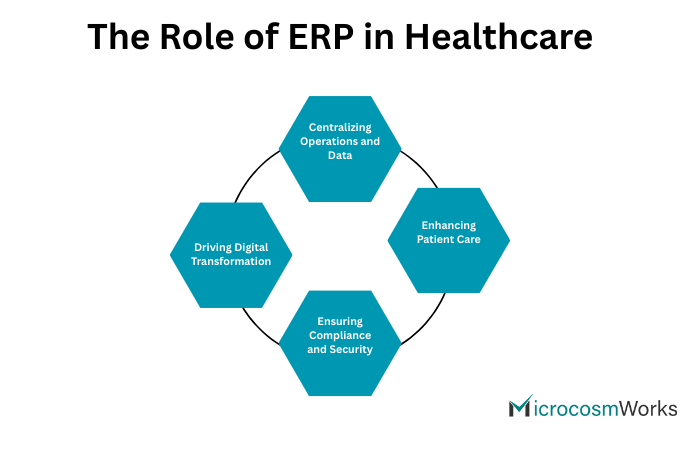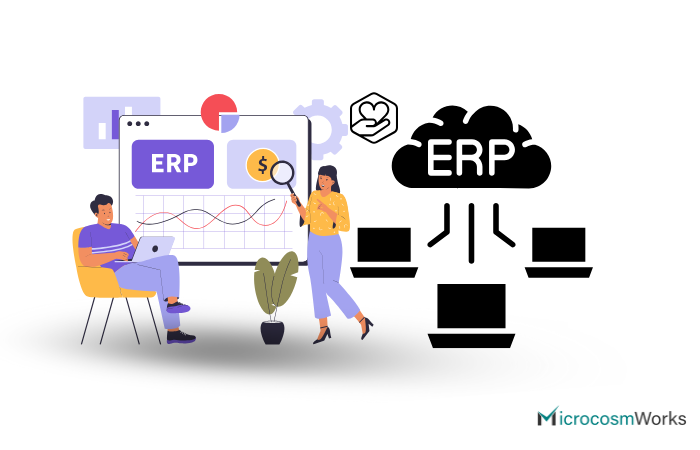Enterprise Resource Planning (ERP) has become a cornerstone of digital transformation in the healthcare sector. With the rising complexity of hospital operations, regulatory demands, and the need for seamless patient care, scalable ERP for healthcare is not just a luxury—it’s a necessity. This blog explores the role of ERP in healthcare, key considerations for implementation, and the challenges organizations face, while weaving in essential keywords for those seeking modern, secure, and cost-effective ERP solutions.
What is ERP in Healthcare?
An ERP system integrates various functions within a healthcare organization, such as finance, human resources, supply chain, and patient data management, into a unified platform. This integration facilitates real-time data access, improved decision-making, and optimized resource utilization.
The Role of ERP in Healthcare
Centralizing Operations and Data
Healthcare ERP systems serve as the digital backbone for hospitals and clinics, integrating core functions such as patient data management, electronic health record integration, financial planning, supply chain management, and human resources into a single, unified platform. By consolidating disparate healthcare information systems, ERP for hospitals enables real-time access to critical data, streamlining workflows, and enhancing decision-making.
Enhancing Patient Care
A robust hospital management software solution empowers healthcare professionals with instant access to patient histories, treatment plans, and test results. This not only improves care quality but also reduces administrative burdens, allowing clinicians to focus more on patient outcomes.
Ensuring Compliance and Security
With strict regulations like HIPAA, secure ERP platforms for healthcare agencies are essential. HIPAA-compliant ERP solutions incorporate advanced encryption, access controls, and audit trails to safeguard sensitive patient data, reinforcing trust and regulatory adherence.
Driving Digital Transformation
ERP implementation in healthcare is a catalyst for digital transformation, enabling organizations to adopt best practices, automate manual processes, and leverage business intelligence for strategic planning. Healthcare digital transformation agencies and healthcare IT consulting firms play a vital role in guiding this journey, from needs assessment to system deployment and ongoing support.

Key Considerations for Healthcare ERP Implementation
1. Scalability and Customization
Healthcare organizations vary in size and complexity. Scalable ERP for healthcare ensures the system can grow with your organization, while custom ERP solutions for healthcare allow for tailored modules that address unique clinical and administrative workflows.
2. Cost-Effectiveness
Affordable hospital ERP is an essential requirement, especially for small and medium-sized players. Cloud-based ERP for healthcare providers is available on a subscription model, which means it reduces expenditure on the hardware or IT infrastructure provided by the company. Managed ERP services for healthcare further optimize costs by outsourcing maintenance and support.
3. Cloud-Based Solutions
Cloud-based ERP for healthcare providers is gaining traction due to its flexibility, lower capital expenditure, and ease of integration with existing systems. These solutions support remote access, rapid deployment, and seamless updates, making them ideal for modern healthcare environments.
4. Security and Compliance
HIPAA-compliant ERP solutions and secure ERP platforms for healthcare agencies are non-negotiable. Key features include:
- Data encryption (at rest and in transit)
- Role-based access control
- Comprehensive audit trails
- Regular security assessments and data backup
5. Integration Capabilities
Hospital ERP integration services ensure smooth connectivity with legacy systems, electronic health records, medical billing software, and other healthcare IT solutions. This interoperability is vital for maintaining data consistency and minimizing workflow disruptions during migration.
6. ROI and Performance Measurement
ERP ROI in healthcare goes beyond cost savings. Benefits include improved patient outcomes, staff satisfaction, regulatory compliance, and sustainable resource utilization. Setting clear KPIs and leveraging business intelligence tools helps track the impact of ERP systems on operational efficiency and patient care.

Challenges in Healthcare ERP Adoption
1. Complexity of Healthcare Workflows
Customizing ERP software development for hospitals to accommodate diverse clinical and administrative processes requires close collaboration between IT experts and healthcare professionals. Balancing standardisation and flexibility is central to success.
2. Regulatory Compliance
The healthcare industry faces ever-evolving regulations. Ensuring ERP systems remain compliant with HIPAA and other standards demands regular audits, proactive updates, and robust compliance features.
3. Data Security and Privacy
Protecting patient data is paramount. Secure ERP platforms for healthcare agencies must implement multi-layered security, from encryption and access controls to audit trails and disaster recovery protocols.
4. Legacy System Integration
Migrating from legacy systems to modern healthcare ERP systems poses technical challenges. Effective data migration strategies—such as data cleansing, validation, and phased rollouts—are critical to avoid disruptions and maintain data integrity.
5. Cost and Resource Constraints
While ERP systems offer long-term ROI, initial implementation can be costly. Cost-effective ERP for hospitals and cloud-based solutions help alleviate financial barriers, but careful planning and budgeting are essential.
6. Change Management and Training
Adopting new hospital management software requires cultural change and comprehensive training. Early stakeholder involvement and continued education result in smoother transitions and greater utilization.
7. Continuous Support and Optimization
Healthcare ERP systems require ongoing support, updates, and optimization. Managed ERP services for healthcare and ERP audit services for healthcare IT help organizations maintain peak system performance and adapt to changing needs.
Evaluating ERP ROI in Healthcare
Assessing the return on investment (ROI) for ERP systems involves considering both tangible and intangible benefits:
- Cost Savings: Reduced operational costs through automation and improved resource management.
- Revenue Growth: Enhanced billing accuracy and timely reimbursements, leading to increased revenue.
- Improved Patient Satisfaction: Streamlined processes result in better patient experiences and outcomes.
- Regulatory Compliance: Avoidance of fines and penalties through adherence to healthcare regulations.
- Operational Efficiency: Optimized workflows and resource utilization contribute to overall organizational efficiency.
Integrating ERP with Healthcare IT Systems
For an ERP system to be effective, it must integrate seamlessly with existing healthcare IT systems, such as EHRs, laboratory information systems, and pharmacy management systems. This combines real-time operation of patient care and administration.
The Future: AI, Wellness, and Digital Health
The rise of AI in healthcare, fitness app development, and wellness app development is reshaping the industry. Integration of health and wellness software, fitness application development, and healthcare app development services with ERP platforms creates a holistic digital ecosystem for patient engagement, preventive care, and operational excellence.
Healthcare AI consulting and healthcare software development services are driving innovation, enabling predictive analytics, personalized care, and smarter resource planning. As the healthcare industry embraces digital transformation, ERP systems will remain at the heart of this evolution, supported by healthcare technology solutions and healthcare information systems.
Conclusion
ERP for hospitals is no longer just an operational tool—it is a strategic asset that drives efficiency, compliance, and patient-centric care. By prioritizing scalability, security, cost-effectiveness, and integration, healthcare organizations can unlock the full potential of ERP systems. Partnering with experienced healthcare IT consulting firms, healthcare software development agencies, and leveraging managed ERP services for healthcare ensures a successful digital transformation journey.
Whether you are seeking custom ERP solutions for healthcare, exploring cloud-based ERP for healthcare providers, or aiming to integrate electronic health record systems, the right ERP strategy will empower your organization to thrive in an increasingly complex and competitive landscape.
Read More:- Why ERP Application Development Is Essential for Digital Transformation




